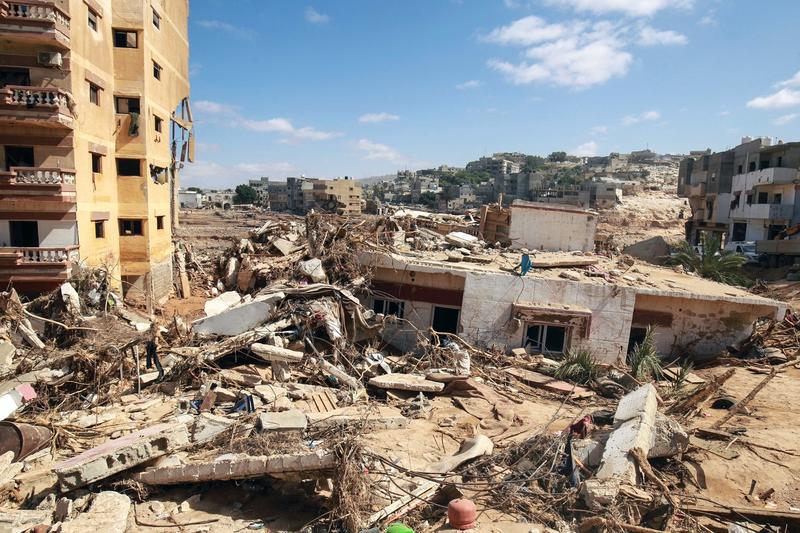Authorities in Libya have opened an investigation into the collapse of two dams that caused devastating flooding in a coastal city, as rescue teams continue to search, nearly a week after the deluge killed more than 11,000 people.
Buildings in the Libyan city of Derna, which collapsed during the floodsPhoto: Abdullah Doma / AFP / Profimedia Images
Libya’s Attorney General Al-Sediq al-Sour said prosecutors would investigate the collapse of the dams, which were built in the 1970s, as well as the allocation of maintenance funds. He said prosecutors would investigate local authorities in the city as well as previous governments.
“I assure the citizens that whoever made mistakes or negligence, the prosecutors will definitely take firm action, file a criminal case against him and send him to court,” he said on Friday in a press conference in the city- port of Derna.
Storm Daniel, which hit the city of Derna overnight Sunday into Monday, led to the breach of two upstream dams, causing a tsunami-like flood along a floodplain, sweeping away everything in its path. .
The floods left behind a desolate landscape, and a large part of the town, on both sides of the floodplain, seems to have been hit by a strong earthquake, an AFP photographer found. Entire buildings were swept away by the waters. Others are half-destroyed, with cars smashed against their walls.
In Al-Bayda, another large city located 100 km west of Derna, residents were cleaning roads and houses from piles of mud left behind by the flood.
Humanitarian organizations such as Secours Islamique and Médecins Sans Frontieres (MSF) have warned of the risks of spreading diseases associated with possible water contamination. Many people were washed away in the Mediterranean Sea, and dozens of decomposing bodies were washed ashore.
Before the disaster, Derna had 100,000 inhabitants. The International Organization for Migration (IOM) reported over 38,000 people displaced in the flood-affected east, 30,000 of them in Derna.
“Chaotic Situation”
Manoelle Carton, the coordinator of a Médecins sans frontieres (MSF) team that arrived two days ago in Derna, described the situation as “chaotic”, which prevented the counting and identification of victims. “Many volunteers from all over Libya and abroad are on the scene. Aid coordination is urgent,” she insisted.
The work of search and rescue teams is considerably hampered by the political chaos prevailing in the North African country since the death of dictator Muammar Gaddafi in 2011, with two rival governments, one in Tripoli (west), recognized by the UN and led by the first minister Abdelhamid Dbeibah, and the other in the east, affiliated to the camp of the influential Marshal Khalifa Haftar.
In order to better organize the search operations, the head of the executive in the east of Libya, Osama Hamad, stated that “from Saturday, new measures will be applied in the affected area”, which will be closed, according to him, to civilians and the security services . “Only Libyan and foreign search teams and investigators will have access,” he said.
Stephanie Williams, an American diplomat and former UN representative in Libya, called for urgent international intervention, advocating the creation of a “joint national/international mechanism to oversee aid funds”.
She criticized on the X network (formerly Twitter) a “predatory” Libyan political class which, in her opinion, tends to “use the pretext of sovereignty” to direct aid operations “according to their own interests”.
“Huge Needs”
Marshal Haftar’s spokesman, Ahmad al-Mesmari, evoked “enormous needs for reconstruction” during a sustained press conference Friday evening in Benghazi, the large city in eastern Libya where protests erupted in 2011.
Although the tragedy occurred in an area under the control of the eastern camp, Abdelhamid Dbeibah said this week that the absence of proper development plans and “wear and tear caused by the passage of time” contributed to it. “It is one of the consequences of quarrels, wars and waste of funds,” he said. (Sources: Guardian, Agerpres)


